-
ARTÍCULO ORIGINAL13/12/2024
Nurses’ experience regarding patient safety in mobile pre-hospital care
Revista Brasileira de Enfermagem. 2024;77(5):e20230529
Resumen
ARTÍCULO ORIGINALNurses’ experience regarding patient safety in mobile pre-hospital care
Revista Brasileira de Enfermagem. 2024;77(5):e20230529
DOI 10.1590/0034-7167-2023-0529
Visualizações0Ver maisABSTRACT
Objectives:
to understand nurses’ experience regarding patient safety in mobile pre-hospital care.
Method:
a qualitative, exploratory and descriptive study, conducted with nurses active in mobile pre-hospital care services. Semi-structured interviews were conducted, audio-graved and submitted to Bardin’s content analysis.
Results:
from four thematic categories established, nurses reported the care and management skills necessary to work in this service. They demonstrated a commitment to ensuring safe care for patients, staff and spectators. They highlighted the actions taken to prevent and mitigate incidents. However, they based their experiences on practice protocols and individual actions, expressing the need to improve knowledge about patient safety.
Final Considerations:
mobile pre-hospital care nurses’ experience in relation to patient safety was limited, suggesting the need for training on the subject, alignment of work processes and implementation of strategies, aiming to guarantee safe care.
-
ARTÍCULO ORIGINAL13/12/2024
Stress in nursing workers caring for people with COVID-19
Revista Brasileira de Enfermagem. 2024;77(5):e20230542
Resumen
ARTÍCULO ORIGINALStress in nursing workers caring for people with COVID-19
Revista Brasileira de Enfermagem. 2024;77(5):e20230542
DOI 10.1590/0034-7167-2023-0542
Visualizações1Ver maisABSTRACT
Objectives:
to analyze stress from the perspective of nursing workers caring for people with COVID-19 in a public hospital in the Recôncavo region of Bahia.
Methods:
this is an exploratory qualitative study, conducted through semi-structured interviews. The data were analyzed using word clouds, similarity trees, and content analysis.
Results:
nursing workers were exposed to stress while attending to patients with COVID-19. The reported stressors in the workplace included: work overload, lack of planning, speed in performing tasks, fatigue, lack of participation in decision-making, lack of support from management, technological changes, excessive responsibility without preparation, interpersonal conflicts, and professional undervaluation.
Conclusions:
exposure to these stressors leads to emotional exhaustion and demotivation, which were intensified during the COVID-19 pandemic.

-
ARTÍCULO ORIGINAL13/12/2024
Knowledge and attitudes of nursing students regarding the sexuality of older adults: a quasi-experimental study
Revista Brasileira de Enfermagem. 2024;77(5):e20240011
Resumen
ARTÍCULO ORIGINALKnowledge and attitudes of nursing students regarding the sexuality of older adults: a quasi-experimental study
Revista Brasileira de Enfermagem. 2024;77(5):e20240011
DOI 10.1590/0034-7167-2024-0011
Visualizações0Ver maisABSTRACT
Objectives:
to compare the knowledge and attitudes of nursing students regarding sexual behavior and sexually transmitted infections (STIs) in older adults before and after an educational intervention.
Methods:
this quasi-experimental study involved a convenience sample of 45 nursing students from a public university, conducted in three stages: pre-intervention, intervention, and post-intervention. A questionnaire was used to assess sociodemographic characteristics, academic training, and knowledge and attitudes on the topic. The intervention was an educational web conference. Paired t-test and Wilcoxon test were used for data analysis.
Results:
there was a statistically significant difference in the knowledge and attitude scores of nursing students before and after the educational intervention (p < 0.001). A significant increase was observed in the knowledge score (from 9.3 to 12.2) and attitude score (from 108 to 117.2) in the post-intervention phase.
Conclusions:
the knowledge of nursing students regarding the sexuality of older adults increased after the educational intervention, and their attitudes on the subject became more positive.

-
ARTÍCULO ORIGINAL13/12/2024
Educational booklet on labor and delivery: validity study
Revista Brasileira de Enfermagem. 2024;77(5):e20240138
Resumen
ARTÍCULO ORIGINALEducational booklet on labor and delivery: validity study
Revista Brasileira de Enfermagem. 2024;77(5):e20240138
DOI 10.1590/0034-7167-2024-0138
Visualizações2Ver maisABSTRACT
Objectives:
to develop and validate an educational booklet on labor and delivery for pregnant women.
Methods:
this methodological study involved constructing and validating a booklet based on Echer’s framework. We used the Content Validity Index and Cronbach’s alpha for content and face validation, selecting judges according to Fering’s criteria. We then conducted a clinical validation with the target population.
Results:
the booklet, developed based on evidence from an integrative review and validated by judges and the target audience, achieved global Content Validity Index of 0.919 and 0.913, respectively. After clinical validation with 22 pregnant women, it included 28 topics and 48 pages, with illustrations by a graphic designer.
Conclusions:
expert judges and the target audience considered this educational technology valid, deeming it a relevant tool for promoting the health of pregnant women.

-
08/12/2024
Contexto ibero-americano da enfermagem: construindo e compartilhando conhecimento
Revista Brasileira de Enfermagem. 2024;77(1):e770101
Resumen
Contexto ibero-americano da enfermagem: construindo e compartilhando conhecimento
Revista Brasileira de Enfermagem. 2024;77(1):e770101
DOI 10.1590/0034-7167.2024770101pt
Visualizações0Na próxima semana, acontecerão dois grandes eventos científicos em Madri e Granada (Espanha). Serão atividades internacionais, específicas e de forma muito especial, embora não exclusivas do campo ibero-americano, organizadas e desenvolvidas por duas sociedades científicas de enfermagem muito importantes, como a Associação de Enfermagem Comunitária (AEC) e a Associação Latino-Americana de Escolas e Faculdades de […]Ver mais -
ARTÍCULO ORIGINAL08/12/2024
Initial nipple damages in breastfeeding women: analysis of photographic images and clinical associations
Revista Brasileira de Enfermagem. 2024;77(1):e20220773
Resumen
ARTÍCULO ORIGINALInitial nipple damages in breastfeeding women: analysis of photographic images and clinical associations
Revista Brasileira de Enfermagem. 2024;77(1):e20220773
DOI 10.1590/0034-7167-2022-0773
Visualizações0Ver maisABSTRACT
Objective:
to analyze the initial nipple damage degree by breastfeeding practice and to associate findings with clinical manifestations of breastfeeding women.
Methods:
a retrospective, cross-sectional study with primary data and photographic images database from two randomized clinical trials. Photographic images were analyzed by two independent evaluators using the Nipple Trauma Score. For analysis, the chi-square, Mann-Whitney tests and Kappa coefficient were applied.
Results:
115 breastfeeding women and their respective 186 photographic images were analyzed. The degree of agreement of evaluators using the Nipple Trauma Score was 93.6%. The nipple pain score during breastfeeding was moderate and compromised more than 25% of the nipple surface area.
Conclusions:
assistance to breastfeeding women should prioritize nipple pain intensity instead of the nipple damage size.

-
ARTÍCULO DE REVISIÓN08/12/2024
Interventions for Strengthening General Self-Efficacy Beliefs in College Students: An Integrative Review
Revista Brasileira de Enfermagem. 2024;77(1):e20230192
Resumen
ARTÍCULO DE REVISIÓNInterventions for Strengthening General Self-Efficacy Beliefs in College Students: An Integrative Review
Revista Brasileira de Enfermagem. 2024;77(1):e20230192
DOI 10.1590/0034-7167-2023-0192
Visualizações0Ver maisABSTRACT
Objective:
To assess the evidence regarding the effectiveness of interventions aimed at strengthening self-efficacy beliefs in college students.
Methods:
Integrative Review conducted on the Lilacs, PubMed, CinahL, Cochrane Collaboration Databases, Scopus, and PsycInfo databases. The methodological quality of the studies was assessed using tools proposed by the Joanna Briggs Institute, and the results were analyzed descriptively.
Results:
Out of the 10 selected studies, six demonstrated that interventions aimed at strengthening self-efficacy were effective (Levels of Evidence II and III), and four revealed contrary results (Levels of Evidence I and II). Programs aimed at enhancing self-efficacy should include content on positive mental health, psychoeducation strategies, cover a period of eight to twelve weeks, and consider the completion of homework assignments.
Conclusion:
The synthesis of evidence pointed to pathways for building an effective self-efficacy strengthening program to be implemented in universities.

-
ARTÍCULO DE REVISIÓN08/12/2024
Common mental disorders in hematopoietic stem cell transplant patients: a scoping review
Revista Brasileira de Enfermagem. 2024;77(1):e20220581
Resumen
ARTÍCULO DE REVISIÓNCommon mental disorders in hematopoietic stem cell transplant patients: a scoping review
Revista Brasileira de Enfermagem. 2024;77(1):e20220581
DOI 10.1590/0034-7167-2022-0581
Visualizações0Ver maisABSTRACT
Objective:
to map common recurrent mental disorders in patients undergoing hematopoietic stem cell transplantation.
Methods:
this is a scoping review carried out in January 2022 in electronic databases and repositories of dissertations and thesis. Studies that answered the research question, met the objective of the study and were available in full electronically, in any language, were included.
Results:
the sample consisted of 28 studies, 14 of which were published in the United States of America. The common mental disorders found were depressive, anxiety, post-traumatic stress and mood disorders. Twenty symptoms were mentioned, among the most prevalent are fatigue and sleep disorders/insomnia.
Conclusions:
the difficulty and importance of carrying out the differential diagnosis of these disorders were highlighted, since their symptoms can be confused with other health problems and have a strong potential to interfere with patients’ evolution.

-
14/04/2021
Child behavior during the social distancing in the COVID-19 pandemic
Revista Brasileira de Enfermagem. 2021;74:e20200762
Resumen
Child behavior during the social distancing in the COVID-19 pandemic
Revista Brasileira de Enfermagem. 2021;74:e20200762
DOI 10.1590/0034-7167-2020-0762
Visualizações0Ver maisABSTRACT
Objective:
To describe the daily activities performed by children from 6 to 12 years of age incomplete and analyze children’s behavior during social distancing in the face of the COVID-19 pandemic.
Methods:
Cross-sectional study with children in a learning stage living in Brazil. The data were collected via online form. Fisher’s exact test was applied to analyze the association of categorical variables with child behavior; when significant, it was used the odds ratio. It was considered results considered statistically significant those presenting values of p < 0.05.
Results:
Data from 530 children were analyzed: 50.3% female, 71.3% from the Southeast Region, 73% in fulltime social distancing, 52% presented anxiety, which was significantly associated with changes in sleep and appetite.
Conclusion:
The results indicate the need for parents/caretakers to stimulate moments for the child to express themselves, not minimizing their feelings and providing emotional support to mitigate the negative impact of these feelings on the child’s mental and physical health.
-
05/12/2019
Hospital care and urinary incontinence in the elderly
Revista Brasileira de Enfermagem. 2019;72:284-293
Resumen
Hospital care and urinary incontinence in the elderly
Revista Brasileira de Enfermagem. 2019;72:284-293
DOI 10.1590/0034-7167-2018-0273
Visualizações0Ver maisABSTRACT
Objective:
to identify factors inherent in hospital care that favor urinary incontinence in the elderly.
Method:
an integrative review with Scopus, CINAHL and Pubmed searches. Includes original articles, no language restriction, published between 2008 and 2018. Rated level of recommendation and level of evidence were assessed using the Oxford Center for Evidence-Based Medicine classification. Exploited content through thematic analysis in light of the Donabedian model.
Results:
13 articles constituted the sample. There were factors such as the unjustified and indiscriminate use of devices such as the geriatric diaper; hospital structure adversely affecting the needs of the elderly; and deficit in screening, risk identification and underreporting of the problem favor urinary incontinence in the hospitalized elderly.
Conclusion:
modifiable factors related to hospital structures and care processes favor both the onset and worsening of urinary incontinence in the elderly.
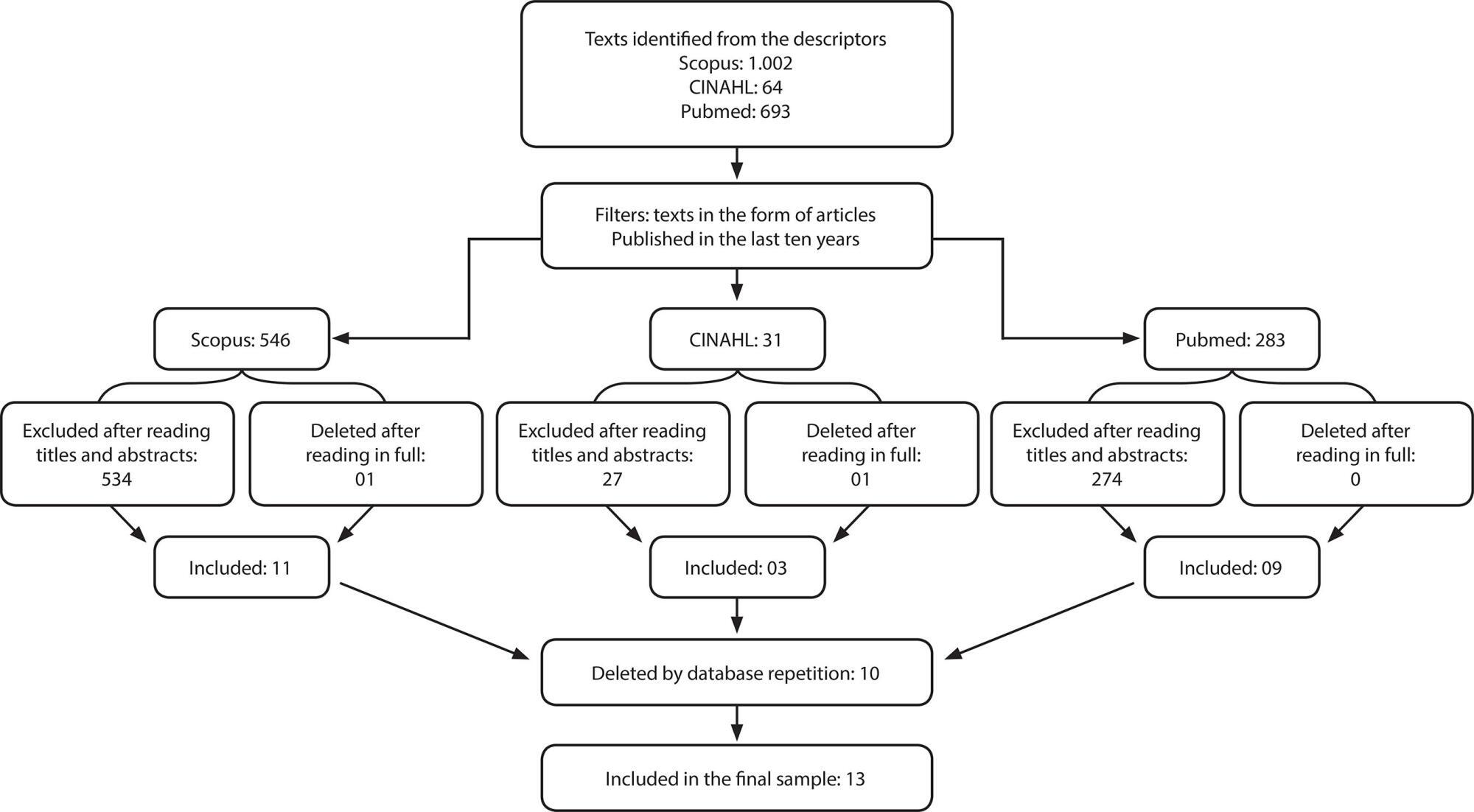
-
ARTÍCULO ORIGINAL21/10/2019
Hipermídia educativa sobre assistência de enfermagem ao parto: construção e validação de conteúdo e aparência
Revista Brasileira de Enfermagem. 2019;72(6):1471-1478
Resumen
ARTÍCULO ORIGINALHipermídia educativa sobre assistência de enfermagem ao parto: construção e validação de conteúdo e aparência
Revista Brasileira de Enfermagem. 2019;72(6):1471-1478
DOI 10.1590/0034-7167/2018-0163
Visualizações1Ver maisRESUMO
Objetivo:
construir uma hipermídia educativa sobre a assistência de enfermagem ao parto de risco habitual e realizar a validação de conteúdo e de aparência.
Método:
pesquisa metodológica, realizada seguindo as seguintes etapas: levantamento do conteúdo e planejamento dos módulos; produção das mídias e organização das unidades tutoriais; organização do espaço do aluno, tutor e de comunicação entre eles; elaboração da hipermídia; disponibilização da hipermídia; avaliação por especialistas em Enfermagem e Informática; e implementação das sugestões propostas.
Resultados:
a hipermídia educativa mostrou-se como um material validado, visto que apresentou um ótimo índice de validade de conteúdo global de 0,97 e significância estatística no teste binomial para o conteúdo e aparência.
Conclusão:
acredita-se que o uso deste material com alunos da graduação em Enfermagem contribuirá com a qualidade da assistência obstétrica, tendo em vista que se constitui em uma tecnologia ilustrada capaz de favorecer o ensino-aprendizagem sobre parto normal humanizado.
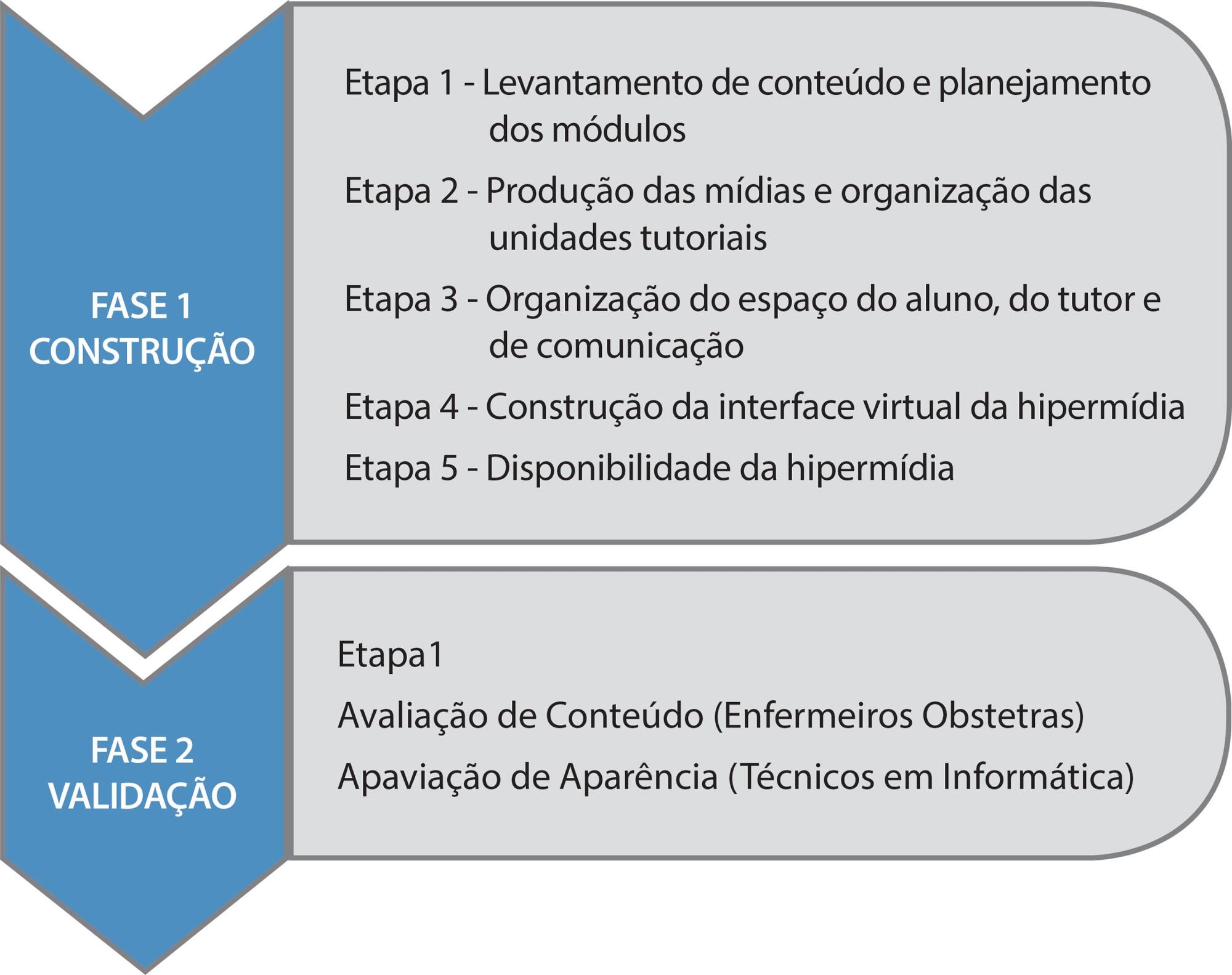
-
ARTÍCULO ORIGINAL30/03/2020
Boas Práticas de segurança nos cuidados de enfermagem em Terapia Intensiva Neonatal
Revista Brasileira de Enfermagem. 2020;73(2):e20180482
Resumen
ARTÍCULO ORIGINALBoas Práticas de segurança nos cuidados de enfermagem em Terapia Intensiva Neonatal
Revista Brasileira de Enfermagem. 2020;73(2):e20180482
DOI 10.1590/0034-7167-2018-0482
Visualizações0RESUMO
Objetivos:
identificar a percepção dos profissionais de enfermagem sobre o erro humano nos cuidados de enfermagem na Unidade de Terapia Intensiva Neonatal; analisar as estratégias de Boas Práticas propostas por esses profissionais para a segurança do paciente nos cuidados de enfermagem.
Métodos:
estudo quanti-qualitativo, descritivo. Cenário: Unidade de Terapia Intensiva Neonatal. Participantes: 22 profissionais de enfermagem. Coleta dos dados realizada por meio de entrevistas e submetidos a análise temática.
Resultados:
erro humano nos cuidados de enfermagem, identificando-se perdas de cateteres e erros no processo de medicação; causas para o erro nos cuidados de enfermagem, destacando-se a sobrecarga de trabalho; Boas Práticas para a segurança do paciente nos cuidados de enfermagem, como capacitação profissional e melhorias das condições de trabalho.
Conclusões:
demonstra-se a importância de investir em estratégias de Boas Práticas para a Segurança do Paciente, buscando-se sedimentar a cultura de segurança organizacional e estimular um ambiente propício ao gerenciamento do erro.
Palavras-chave: EnfermagemErros MédicosGestão de SegurançaSegurança do PacienteUnidades de Terapia Intensiva NeonatalVer mais -
ARTÍCULO DE REVISIÓN29/09/2022
Nursing students’ learning from involvement in research projects: an integrative literature review
Revista Brasileira de Enfermagem. 2022;75(1):e20210053
Resumen
ARTÍCULO DE REVISIÓNNursing students’ learning from involvement in research projects: an integrative literature review
Revista Brasileira de Enfermagem. 2022;75(1):e20210053
DOI 10.1590/0034-7167-2021-0053
Visualizações0Ver maisABSTRACT
Objective:
To identify the learning outcomes and skills obtained of undergraduate nursing students involved in research projects.
Methods:
This was an integrative literature review, based on a research protocol in the CINAHL Complete databases; Cochrane Central Register of Controlled Trials; Cochrane Database of Systematic Reviews; Cochrane Methodology Register; MedicLatina; MEDLINE, Scopus and JBI, including primary and secondary studies, published between 2015 and 2020.
Results:
A total of five heterogeneous articles were included, which were categorized using Kirkpatrick’s (adapted) model. Seventeen learning outcomes acquired through participation in research projects were identified, from the learning of new knowledge and skills to the development of new attitudes and behaviors.
Final considerations:
The involvement of nursing students in research projects is important to their professional development. Future investment in research on this topic can help cement the potential of this type of student involvement.
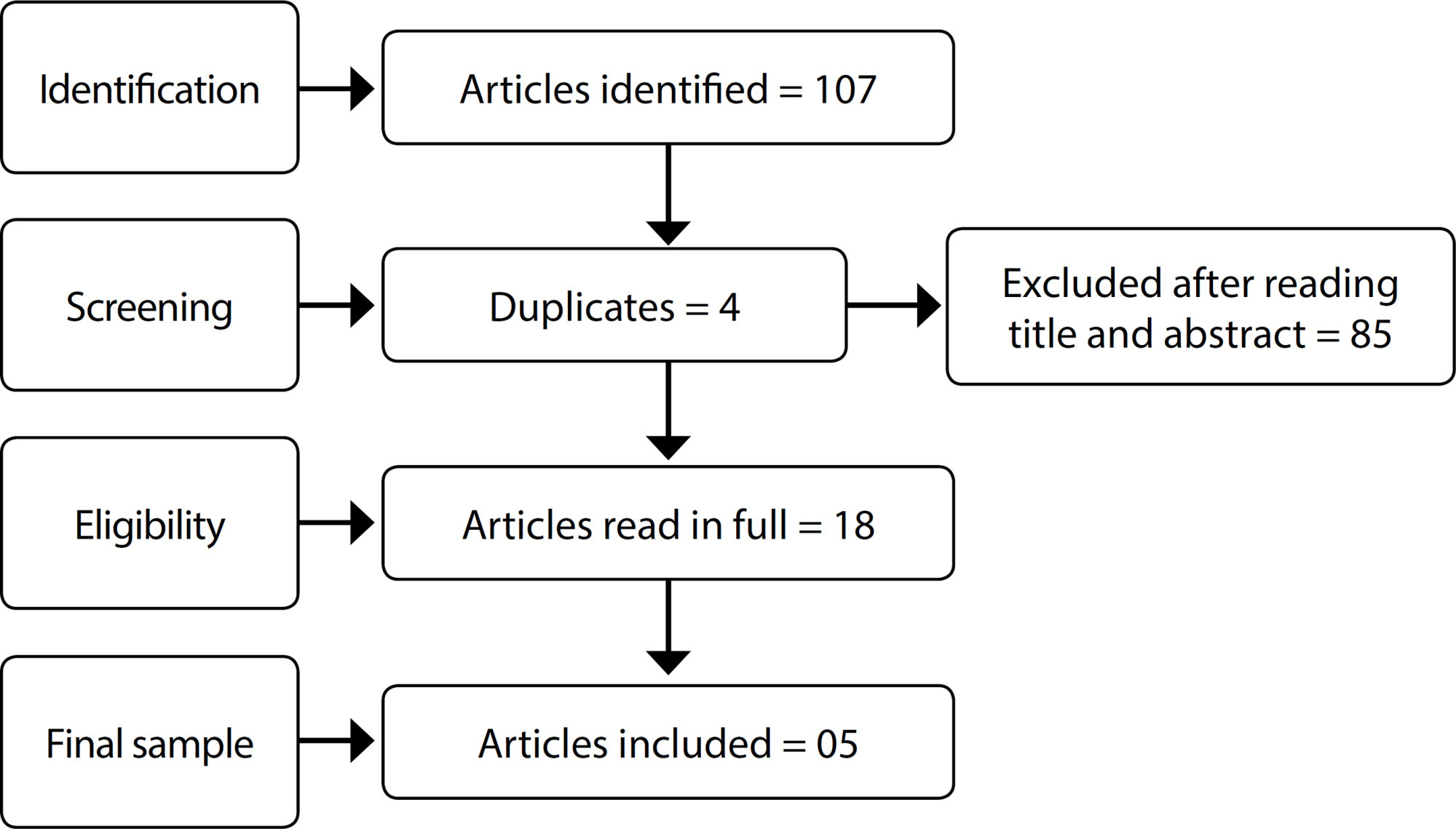
-
ARTÍCULO ORIGINAL05/12/2019
Qualidade de vida relacionada à saúde em pacientes com insuficiência cardíaca
Revista Brasileira de Enfermagem. 2019;72:140-146
Resumen
ARTÍCULO ORIGINALQualidade de vida relacionada à saúde em pacientes com insuficiência cardíaca
Revista Brasileira de Enfermagem. 2019;72:140-146
DOI 10.1590/0034-7167-2018-0368
Visualizações1RESUMO
Objetivo:
Avaliar a qualidade de vida relacionada à saúde dos pacientes com insuficiência cardíaca e relacionar aos dados sociodemográficos e clínicos.
Método:
Trata-se de estudo observacional, de corte transversal, com abordagem quantitativa realizado em ambulatório de insuficiência cardíaca no estado de Pernambuco.
Resultados:
Na amostra (n=101) houve predominância de homens, maiores de 60 anos, casados, profissionalmente inativos. A qualidade de vida relacionada à saúde, a partir do questionário Minnesota Living With Heart Failure Questionnaire foi considerada moderada (34,3±21,6), apresentando relação significativa com idade (p=0,004), classe funcional (p<0,001) e em pacientes com cardiopatia chagásica (p=0,02).
Conclusão:
A qualidade de vida no grupo IC de etiologia chagásica esteve mais comprometida, especialmente na dimensão emocional. Sugere-se a realização de estudos abordando as hipóteses de que maior tempo de acompanhamento ambulatorial melhora a qualidade de vida e que ter doença de Chagas interfere negativamente na qualidade de vida de pacientes com insuficiência cardíaca.
Palavras-chave: Assistência AmbulatorialDoença de ChagasEnfermagemInsuficiência CardíacaQualidade de VidaVer mais -
ARTÍCULO DE REVISIÓN21/12/2020
Aplicação da metodologia Lean Seis Sigma nos cenários de assistência à saúde: revisão integrativa
Revista Brasileira de Enfermagem. 2020;73:e20190861
Resumen
ARTÍCULO DE REVISIÓNAplicação da metodologia Lean Seis Sigma nos cenários de assistência à saúde: revisão integrativa
Revista Brasileira de Enfermagem. 2020;73:e20190861
DOI 10.1590/0034-7167-2019-0861
Visualizações0RESUMO
Objetivo:
analisar a produção científica sobre os resultados da metodologia Lean Six Sigma nas instituições de assistência à saúde.
Métodos:
revisão integrativa da literatura, com a seguinte pergunta: quais são os resultados nas instituições de saúde com a utilização da metodologia Lean Six Sigma e Six Sigma? A busca foi realizada nas bases de dados MEDLINE, LILACS, BDENF, CINAHL, Web of Science e Scopus, sem recorte temporal.
Resultados:
foram incluídos 34 artigos, publicados entre 2005 e 2019, sendo 52,9% provenientes dos Estados Unidos da América. As melhorias mais comumente encontradas foram em instituições hospitalares e na perspectiva dos clientes e processos internos.
Conclusão:
a utilização da metodologia Lean Six Sigma se demonstrou eficaz nos diversos cenários de assistência à saúde, se destacando uma lacuna em sua aplicação quanto ao engajamento e capacitação de pessoas.
Palavras-chave: Administração em SaúdeAssistência à SaúdeControle de QualidadeGestão da Qualidade TotalMelhoria de QualidadeVer mais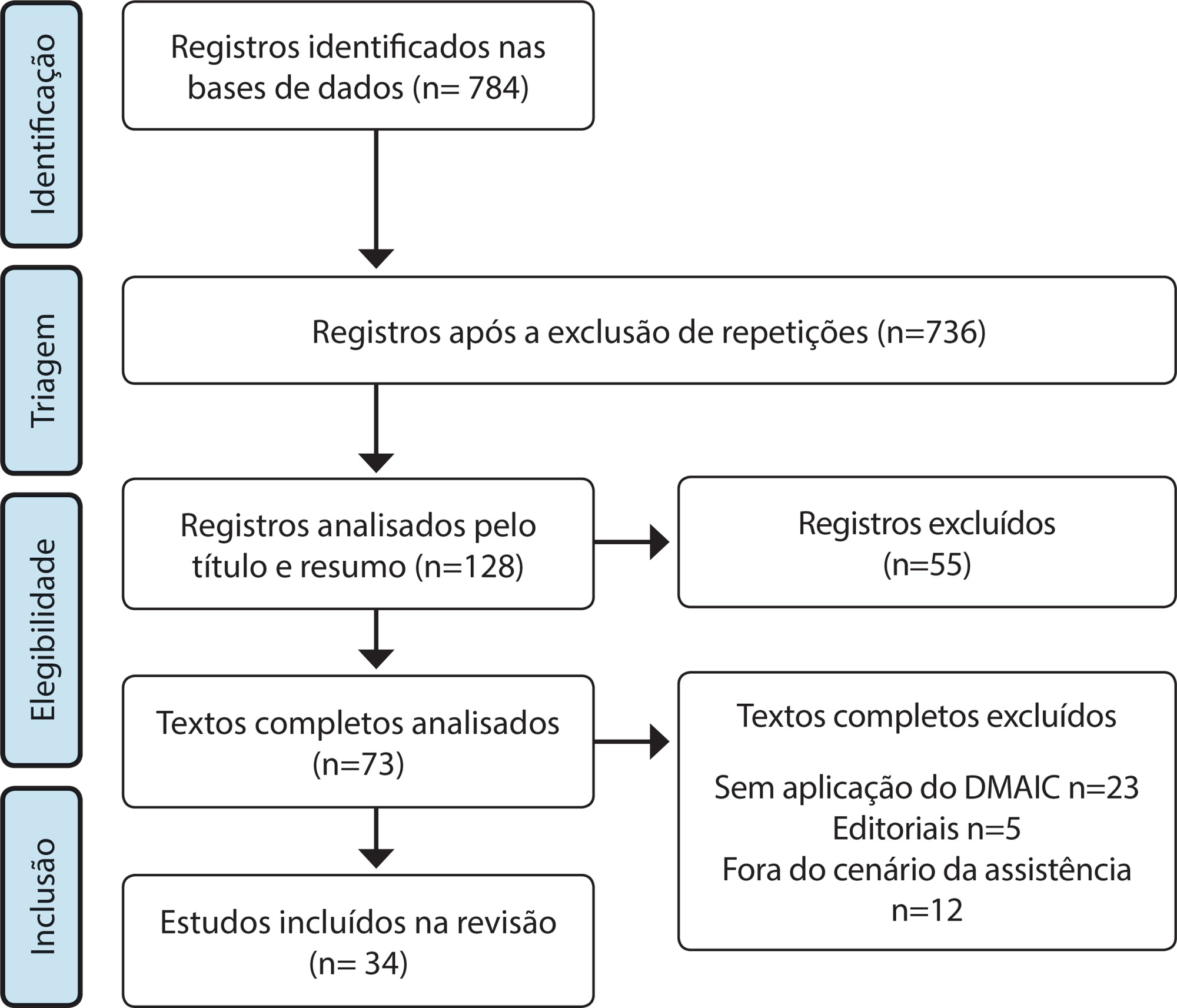
-
ARTÍCULO ORIGINAL17/02/2020
Análise dos registros de técnicos de enfermagem e enfermeiros em prontuários
Revista Brasileira de Enfermagem. 2020;73(2):e20180542
Resumen
ARTÍCULO ORIGINALAnálise dos registros de técnicos de enfermagem e enfermeiros em prontuários
Revista Brasileira de Enfermagem. 2020;73(2):e20180542
DOI 10.1590/0034-7167-2018-0542
Visualizações0RESUMO
Objetivos:
analisar as principais não conformidades dos registros de enfermagem de um hospital público do Nordeste na cidade de Natal.
Métodos:
estudo descritivo, transversal, abordagem quantitativa. Realizado em enfermarias médicas e cirúrgicas. Amostra composta de 120 prontuários de pacientes internados entre outubro e dezembro de 2016. Os dados obtidos foram tabulados e analisados por estatística simples em frequência absoluta e relativa com o software Microsoft Excel 2013. Para avaliar as não conformidades dos registros, usou-se o Diagrama de Pareto.
Resultados:
como principais problemas nos registros de enfermagem, destacou-se a ausência da categoria profissional e número do conselho, responsáveis por 41,8% das não conformidades nos registros de técnicos de enfermagem, enquanto nas anotações dos enfermeiros foram a ausência de hora e as letras ilegíveis, com 61,2%.
Conclusões:
o estudo evidenciou que os profissionais de enfermagem realizam seus registros de forma incompleta e que muitas vezes não documentam o cuidado prestado.
Palavras-chave: ComunicaçãoEnfermagemPesquisa sobre Serviços de SaúdeRegistros de EnfermagemSegurança do PacienteVer mais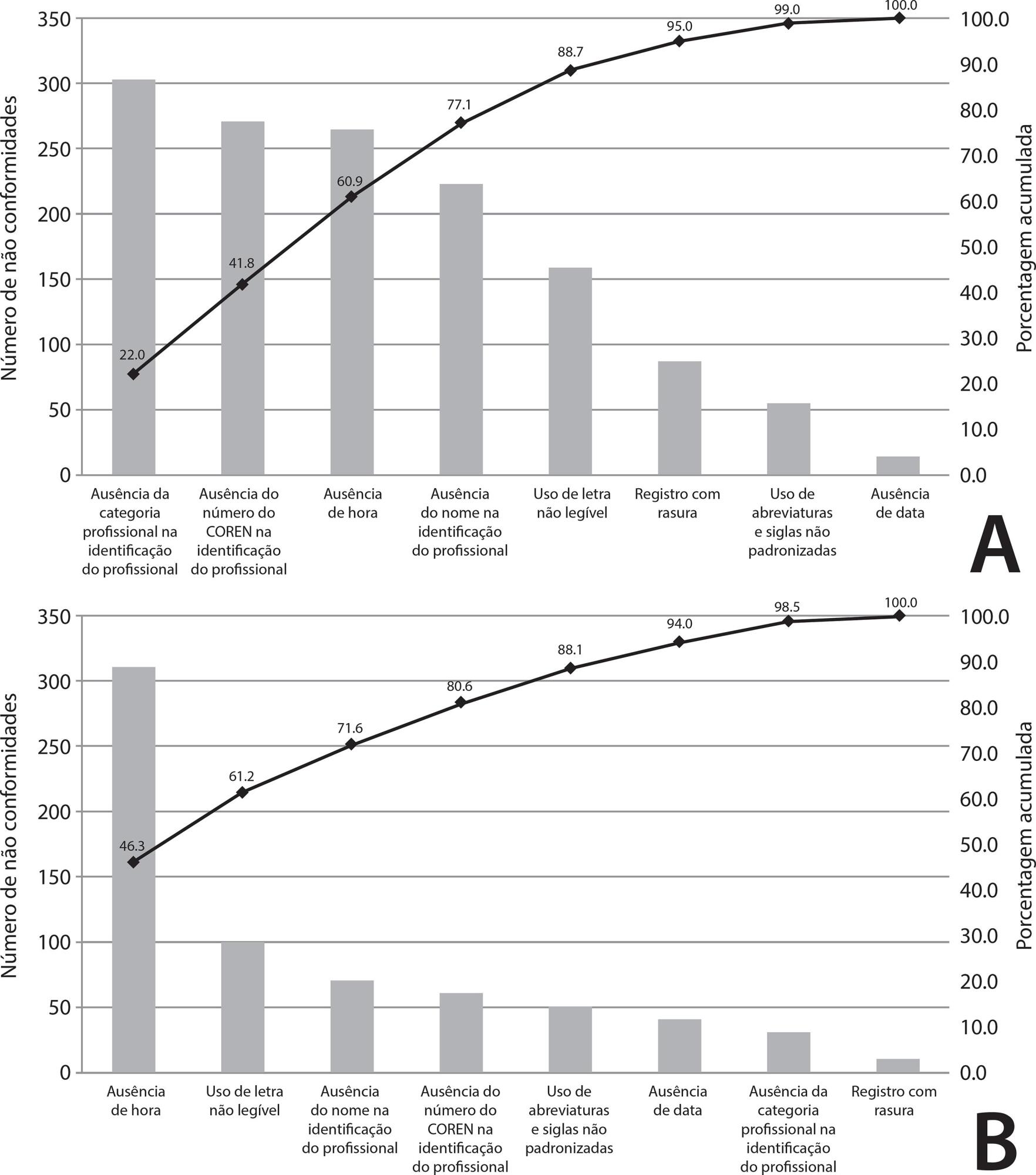
Búsqueda
Buscar en:
Nuvem de Tags
Adolescente (85) Atenção Primária à Saúde (239) COVID-19 (91) Criança (91) Cuidados de Enfermagem (269) Educação em Enfermagem (151) Educação em Saúde (139) Enfermagem (930) Enfermagem Pediátrica (86) Estudantes de Enfermagem (77) Estudos de Validação (131) Família (87) Idoso (208) Promoção da Saúde (99) Qualidade de Vida (104) Saúde do Trabalhador (86) Saúde Mental (145) Saúde Pública (82) Segurança do Paciente (150) Tecnologia Educacional (100)



